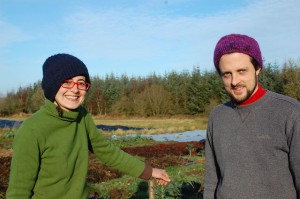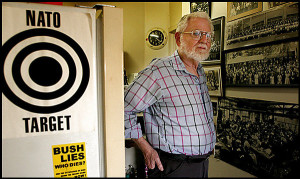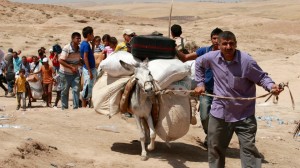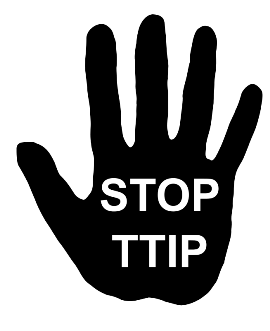Digging in for a new food system in Ireland
Interview with Fergal Anderson
After years of involvement in the work of social movements in Europe and Latin America, young Fergal Anderson with his partner Emanuela Russo, who he met a few years ago in Barcelona, decided to go back to his homeland and start a small vegetable farm in county Galway, Ireland.
By Pavle Antonović and Vladimir Bogićević (FreedomFight.net)
After graduating, Emanuela in Journalism and Communication and Fergal in Public Advocacy and Activism, they both have been politically active – Fergal working on the issues of agricultural policy in Brussels with Via Campesina, and Emanuela working online on the Nyeleni newsletter on Food Sovereignty. However, they realized that political engagement was not enough, and dedicated themselves to living a real farmers life – something they didn’t even imagine possible when they graduated from high school.
Fergal Anderson talked to The Freedom Fight Info about their everyday work, general social conditions in Ireland, difference between organic and industrial products and Food Sovereignty.
– Are conditions in Ireland favorable for young farmers and farmers in general? Can you earn enough for living from your farm? What do you produce and is it possible to compete with big agribusiness and its cheap products?
Some farmers are certainly doing well- particular larger farms and those with better land. The subsidies system also ensures that medium-sized farms are still able to function, even if the prices the farmers get for their products are low. However, the average farm income is around 19,000 euro, far below the average industrial wage, and most farmers rely on subsidies to reach even their low incomes. Unlike most farmers in our area who raise sheep on cattle on pasture, we grow a small area of vegetables and sell them through a box scheme. Our prices are pretty low – we try and keep the box affordable for everyone, even if we are not at the stage where we could be said to be making a living. Of course we receive no subsidies or supports from the CAP to supplement our income. As for “competing” with agribusiness products – I always say that we are not competing because we are not producing a comparable product. People recognize the differences between our fruit, veg and eggs and the industrial varieties instantly, and know they are not the same thing. We think if we could treble our production in the next two years we should be able to make a living from the farm – not including the potential income from running courses, educational workshops etc that could also be an option. However, getting to the stage where we are producing three times more could be a challenge.
– What are the main obstacles for small farmers in Ireland and are there any specific differences comparing to other EU countries? How Ireland’s EU membership affects small farmers?
As in other countries in Europe, farm numbers are falling, and farm sizes are increasing – the average farm size in Ireland is now relatively large- around 30 hectares. However, there are still a great number of older farmers whose holdings would be smaller – around 10 to 15 hectares. Ireland had an extensive land redistribution programme post-independence and many people were allocated small farms. While most of these have been consolidated many still exist, particularly in marginal areas away from the main production zones of the south, east and south-east.
Ireland’s situation in Europe is different due to historic circumstances. Ireland is a post-colonial state and its agriculture reflects the colonial exploitation model which would have established systems of production and extraction which are based on capital and elite control of the production system. This has changed little, and with Ireland’s entry into the EU has intensified with the creation of agri-business enterprises working on the global markets. Smaller farmers in particular are stuck in a production system which sees them accruing little or no added value from their produce, and providing only raw materials to the agribusiness processing and export systems which operate in regional and International markets.
– How come you decided to come back to Ireland and start a farm? Young people mostly immigrate to the cities or to the other countries, why do you think the reverse has any chance to be a good choice?
As in most countries, the older farmers in Ireland are disappearing and many of the younger generation which is taking up farming are very much plugged into the techno-modernization agribusiness system. I wanted to show that a very small farm holding can provide employment, food and other benefits in the community. Many young people who are emigrating see farming as a backwards activity of hard work and few rewards. It would be good if we could encourage more young people into the kind of farming we are doing. That said, our solutions are not ones which will work for most livestock farmers. We need to work with them to find solutions for their farms too.
– Do you feel like you have a support of your local community for coming back and starting a farm? Are there more stories like yours around?
I think there is lots of support in the local community. In Ireland there are many people living in the countryside who are more into self-sufficency – I suppose the difference with us is that we want to make a real living form the land, through producing food. What we are doing wouldn’t be too common in our immediate area, but we know some other young farmers with similar ideas who are not too far away. Any of the local farmers who have come to see what we are doing have been supportive – they are old enough to remember that doing nearly everything by hand is hard work, but they appreciate that too I think.
– Please describe your working week and everyday tasks…
Tasks vary…we are generally up around half past 8, first job is to let the chickens and ducks out of their coops. They need some feed and the water changed. The rest of the day really depends on what we’re working on – we’ve been building some storage sheds/barns over the summer, or else there is always work in the garden, sowing, planting, weeding, tidying…there is some flexibility, so we can do what we feel like doing on a given day. We also keep bees which kept us busy over the summer. There are some tasks though that just need to be done, so it’s good to set priorities. We try and write a list every week or so to keep track of the stuff we need to do and not forget. We also make a careful note of what we sow, where and when. That’s to keep track of the garden. In the winter the tasks changed…now I will be working on our small area of woodland, clearing trees for fuel.
– Tell us more about your views on work of Via campesina and Food Sovereignty concept… Are small farmers in Ireland organizing themselves to improve their position and how?
Well, there has probably never been a better time for Food Sovereignty. The multiple economic crises are opening up people’s eyes to the roles of banks, corporations and the global markets in making a mess of their lives. This process takes time, but I think the goalposts have shifted – so much credibility has been lost that there is finally room in the public consciousness for an alternative. I think that if we can out there, organized together and motivate people, that society is ready for change.
At the same time there are big challenges – in Ireland mostly with our political system, which has major flaws and is deeply conservative. Small farmers are not well organized and the debate on food and agriculture is dominated by the agribusiness corporations who are soaking up big profits. Also, people are not familiar with Via Campesina, or Food Sovereignty.
That said, there is space for an alternative message. We’re trying to get organized to bring that message out. The word “sovereignty” is at least on everyone’s lips as Ireland continues to implement the terms of a bank bailout dictated by the EU, IMF and ECB
– What social movements and organizations in Ireland in your opinion are doing a good work?
There are lots of small organizations in Ireland working hard. Gluaiseacht, AFRI, the Debt and Development Coalition, and many more which are trying to work against the neoliberal system. There are also quite a few citizen initiatives focusing the anger of citizens against the banking system. There is an anti-austerity alliance which has also mobilized well in the last few years. That said, there remains a great deal of apathy in the population at large, and very little in terms of big mobilizations in comparison with some other European countries.
– Can you tell us more about landgrab in Ireland?
Internally, there are no specific cases of landgrabbing apart from the usual property speculation around urban areas and a corrupt planning process.
Agricultural land is expensive by European standards, and when a farm is sold it is often to neighbouring farmers who are happy to get the land. Changes to the CAP may serve to exacerbate this process and make demand for land higher still.
Spatial planning in Ireland was very poor during the construction boom and there remain some very badly designed urban and rural areas, with dispersed housing and few services.
Some Irish agribusiness entrepreneurs have been involved in landgrabbing overseas, although it is difficult to get concrete data on this.
FreedomFight.net



















